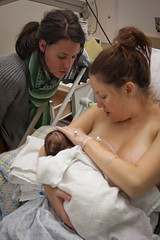
Doulas & Breastfeeding. Photo by Nick Van Snellenberg
Breastfeeding is such a hot topic to discuss because there are so many benefits for the mother, the child, the environment and the health care system. Breastfeeding is an important part of the pregnancy and birth process and is by far the best way to provide your infant with good nutrition.
The mother is a walking food source that sets up both you and baby for a beautiful, harmonious start to a new life and a new journey. Breastfeeding has countless benefits for you and baby. So it’s best to start on the right foot, or shall we say, the right breast!
Breastfeeding Benefits For Your Baby:
- Supports optimal brain development
- Protects against illnesses and infections
- Decreases allergies
- Provides all vitamins and nutrients
- Creates a feeling of safety and love through bonding
- Costs NOTHING
- No preparation needed
- Faster uterus recovery
- Decreases risk of cancers
- Lowers risk of postpartum depression
What To Eat While Breastfeeding
Many new moms wonder what to eat while breastfeeding to ensure their new baby is receiving all the nutrients they need. A lot of new moms also worry about shedding their pregnancy weight. The best thing you can do is listen to your body, trust that you will naturally lose your pregnancy weight through breastfeeding and maintaining a well-balanced diet. You will likely find you are hungrier and thirstier while you breastfeed. Please make sure to eat as much healthy food as you need to feel energized and healthy while you are breastfeeding.
The Calorie Story
Your baby requires approximately 2-3 ounces of breast milk per pound of weight. Each ounce of breast milk contains about 20 calories. Initially, you will be giving out 300-400 calories per day, and more as baby continues to grow. On average, you will need 500-1000 calories more than you were consuming during pregnancy. Some mothers intentionally consume fewer calories in order to lose pregnancy weight, but please avoid doing this! Once baby begins to wean off breast milk and your level of nursing decreases, then you will require less caloric intake.
Proper nutrition during breastfeeding is essential for preventing depletion of the mother and to provide the right nutrients for growing baby. Here are some of the major foods, fluids, vitamins and minerals you need to make sure you are providing yourself and baby with all the nutrition you need during breastfeeding:
Water is the main ingredient in your breast milk! Make sure you are drinking enough fluid to accommodate the water you lose during breastfeeding. In generally, you’ll want to aim for 3 liters of water per day. It’s best for your body to drink water at room temperature, and chlorine-free, filtered water is best. We mentioned her in our last post, but Mary at water matters is truly Vancouver’s water expert, helping Vancouver families consume safe and healthy drinking water, free from chlorine and chlorine by-products.
Wholesome and Organic Fruits and Vegetables, especially dark, leafy veggies and citrus fruits high in Vitamin C. Eating pesticide free, non-GMO produce is always preferrable, but do what you can in terms of your resources and budget.
Whole Grains provide important minerals for you and baby during breastfeeding. Quinoa, millet, whole wheat, rye and oats are good choices to incorporate into your diet.
Protein is important for proper muscle and brain development. Good sources of protein are eggs, meat, legumes, beans, nuts and seeds.
Vitamins and Minerals: You will require about the same amounts of calcium, magnesium and iron as you did while you were pregnant, and even more Vitamin A, Vitamin C, Zinc and Iodide.
Note: Your folic acid requirements decrease by 25% as your blood volume begins to decrease after birth. Vitamin B, specifically Vitamin B6, can actually reduce milk production, so high doses of Vitamin B supplements are best avoiding during lactation. The B Vitamins can be great for relieving stress and fatigue which are common during the early postpartum period; make sure to consult with your care provider regarding appropriate doses. Often, supplementing with Vitamin B is fine, as long as the dose is appropriate. Contact us for information on prenatal nutritionists in Vancouver.
Do I need to drink milk while breastfeeding?
Eating dairy can be a controversial topic in the nutrition world. Generally speaking, if you are going to drink milk, non-homogenized is best. Here in Vancouver, we have access to one brand of non-homogenized milk made by Avalon Dairy. If you choose not to incorporate dairy into your breastfeeding nutrition plan, it is important to get calcium from other sources. You can get calcium from eating plenty of dark, leafy vegetables, or with a good calcium supplement. Check out this article written by a local Holisitic Nutritionist for non-dairy sources of calcium.
Vegetarians & Breastfeeding: Am I getting enough nutrients for feeding baby?
Again, listen to your body. It is certainly possible to maintain your vegetarian lifestyle while breastfeeding, but you do need to be mindful that you are getting all the required nutrients for your baby’s development. For vegetarian women, it is extremely important to eat the recommended amount of calcium and eggs to meet your Vitamin D and protein needs during breastfeeding. Vegan mothers really need to focus on eating more whole grains, legumes, nuts and seeds, as well as taking any necessary supplements. Additional protein powder or supplemental amino acids may be useful if your protein intake is not sufficient.
General Pregnancy and Breastfeeding Nutrition Plan
Adapted from Mowry’s Basic Nutrition and Diet Therapy by Sue Williams
Milk Foods: milk, cheese, yogourt, butter (1 serving = 1 cup)
Servings Per Day: Pregnant 3-4 Breastfeeding 5-6
Cereal Grains: quinoa, millet, whole wheat bread, oats (1 serving = 1 cup, 1 slice)
Servings Per Day: Pregnant 4-5 Breastfeeding 5
Vegetables: raw yellow or dark green (1 serving = 1 cup)
Servings Per Day: Pregnant 2 Breastfeeding 2
Other Vegetables: (1 serving = 1 cup)
Servings Per Day: Pregnant 2 Breastfeeding 2
Vitamin C Foods: citrus, berries
Servings Per Day: Pregnant 2 Breastfeeding 2
Eggs: (1 serving = 1 egg)
Servings Per Day: Pregnant 1-2 Breastfeeding 1-2
Meat: poultry, fish (1 serving = 4 oz)
Servings Per Day: Pregnant 1-2 Breastfeeding 2-3
Legumes: (1 serving = 1 oz)
Servings Per Day: Pregnant 1-2 Breastfeeding 1-2
*The above information is a general guideline only. Always speak to your care provider, or consult with a nutritionist / dietitian about ensuring your breastfeeding nutrition habits are healthy.
Your comfort is very important for maintaining a positive bonding experience between you and your child during breastfeeding. Using both breasts regularly and relaxing before and after nursing will allow for easier and more plentiful milk production. Rubbing colostrum into your nipples after breastfeeding can help moisturize and prevent nipple tenderness. Applying a small amount of olive oil or coconut oil can also help relieve nipple dryness if necessary.
If you are experiencing problems breastfeeding, there are many resources available to you in Vancouver:
Lactation Consultants:
Vancouver Breastfeeding Clinic
Breastfeeding Supplies (specialty feeding devices, breastpumps and supplies, PumpEase for hands-free pumping)
Happy Breastfeeding from Birth Takes a Village. Offering Doula-supported home births and hospital births in Vancouver, BC.
